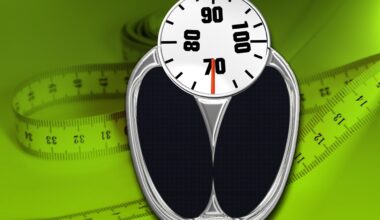Nutrition Timing: When to Eat for Faster Recovery
Proper nutrition timing is essential for athletes and those engaged in regular exercise, as it can significantly affect recovery and performance. After intense workouts, the body seeks nutrients to repair and rebuild muscles. Carbohydrates and proteins are crucial in this process. Consuming carbohydrates replenishes glycogen stores, whereas protein aids in muscle repair. It’s crucial to strategically time nutrient intake around workout sessions. Aim to consume a balanced meal or snack within 30 minutes to two hours post-exercise. This period is often referred to as the “anabolic window” because muscles are particularly receptive to nutrients during this time. A well-timed intake of carbohydrates and protein can help reduce muscle soreness and promote recovery. For optimal results, consider incorporating simple carbohydrates, like bananas or sports drinks, alongside protein sources such as whey protein shakes or Greek yogurt. Additionally, adequate hydration is important, especially after intensive workouts. Water aids in nutrient absorption and overall recovery processes. Always listen to your body, as nutritional needs may vary based on individual goals and workout intensity. Keeping a structured nutrition plan can lead to better training outcomes and quicker recoveries, making it a vital aspect of any fitness regimen.
Understanding Macronutrients
Before diving into nutrition timing, it’s essential to understand the role of macronutrients in recovery. Macronutrients consist of three primary components: carbohydrates, proteins, and fats. Each plays a distinct role in the recovery process. Carbohydrates serve as the primary energy source for high-intensity workouts. When consumed post-exercise, they help replenish glycogen stores in muscles, allowing athletes to train effectively in subsequent sessions. Proteins, on the other hand, are vital for repairing muscle tissues that are damaged during rigorous workouts. They provide the amino acids needed for muscle recovery and growth. Lastly, fats play a role in hormonal balance and nutrient absorption. While they are not the primary focus immediately after exercise, they should still be incorporated into your overall nutrition strategy. Understanding how to balance these macronutrients around workouts can prevent fatigue and enhance performance. Many sports nutritionists suggest a ratio of 3:1 or 4:1 carbohydrates to protein in post-exercise snacks. This ratio is tailored to maximize recovery by providing the body with essential nutrients without excessive calories. Hence, pay attention to macronutrient distribution in meals and snacks to enhance recovery and improve performance.
Timing also extends to the pre-exercise meal, which is crucial for energy levels and performance. Ideally, consume a balanced meal consisting of carbohydrates, proteins, and some healthy fats about two to three hours before working out. This pre-exercise meal prepares the body by providing essential nutrients crucial for exercise performance. Recommended carbohydrates include whole grains, fruits, and vegetables. Incorporating lean proteins like chicken or fish in this meal will help sustain energy levels throughout the workout. Hydration is equally important; drink water before exercise to ensure the body is well-hydrated. A well-hydrated body can perform better and recover faster. In contrast, consuming a heavy or high-fat meal just before exercise may lead to digestive discomfort. Therefore, it’s advisable to experiment with meal timing and composition during training sessions. Adjust these factors to find the optimal balance that works for you. Listening to your body will help determine the best nutrition timing before workouts, support performance, and accelerate recovery. By establishing a routine that emphasizes timing, you create a supportive environment for both training effectiveness and recovery, ultimately improving your fitness journey.
The Role of Hydration
Hydration plays an essential role in recovery and overall athletic performance. Water is involved in every process of digestion and nutrient absorption, making it crucial during and after exercise. Dehydration can impair performance, reduce strength, and lead to fatigue, all of which can hinder your recovery efforts. It’s important to hydrate before, during, and after workouts for optimal recovery. Aim to drink at least 16-20 ounces of water two hours before exercising. During workouts, sip water regularly, particularly during prolonged sessions. After exercise, replenishing lost fluids can drastically improve recovery times. Additionally, electrolyte-rich drinks can be beneficial, especially for those engaging in high-intensity activities or extended workouts. Electrolytes such as sodium, potassium, and magnesium help maintain fluid balance and muscle function, preventing cramps and fatigue. A post-exercise hydration strategy should include both rehydration with water and the right mix of electrolytes. Understanding your individual hydration needs depending on workout intensity and duration can enhance recovery. Sites and apps for tracking hydration or electrolyte intake can be useful for keeping your goals aligned. Ultimately, hydration is fundamental in the recovery equation, helping ensure you’re fully equipped for your next training session.
Consider diversifying your diet with nutrient-dense foods to enhance recovery. A diet rich in fruits, vegetables, whole grains, lean proteins, and healthy fats offers the essential vitamins and minerals necessary for optimal recovery. Foods high in antioxidants, such as berries or spinach, help combat inflammation and oxidative stress caused by high-intensity exercise. Incorporating sources of omega-3 fatty acids, found in fish like salmon or flaxseeds, can also reduce inflammation and aid in muscle recovery. Additionally, certain herbs and spices like turmeric or ginger have been shown to possess anti-inflammatory properties that can support recovery from workouts. Aim to include a variety of colors on your plate to maximize nutrient intake and support your body’s recovery. Healthy snacks like nuts and protein bars between meals may also help maintain energy levels and facilitate muscle repair. However, avoid processed foods high in sugar and unhealthy fats, as they can lead to inflammation and sluggish recovery. Focus on whole food choices and balanced meals to provide sustained energy. By cultivating a healthy nutrient-rich eating strategy, you can enhance recovery prospects significantly while supporting overall health.
Creating a Personalized Recovery Plan
Your recovery needs may vary based on workout intensity, duration, and personal fitness goals. Developing a personalized recovery plan will help you identify what works best for you. Start by analyzing your workout routine to establish a baseline for recovery requirements. Consider how different types of exercises, like strength training and cardio, affect your body differently. Tracking your food and water intake can help determine if you’re providing adequate nutrition for recovery. Additionally, listen to your body’s response to food timing and hydration levels. Monitoring muscle soreness, fatigue, and performance can guide you toward necessary adjustments in your recovery approach. A well-structured recovery plan should include recovery days, restorative practices like yoga or foam rolling, and adequate sleep. Sleep is essential as it allows your body to repair and rebuild. Aim for seven to nine hours per night. As you create your recovery plan, maintain flexibility to adjust meals and hydration based on personal observations and workout feedback. Documenting your recovery experiences can aid in improving strategies over time, ultimately leading to continued progress and enhanced physical performance.
Nutrition timing is a powerful tool that can enhance recovery and improve athletic performance. Whether it’s pre- or post-workout nutrition, understanding when to eat ensures that your body receives the necessary nutrients at optimal times. A thoughtful approach to hydration coupled with a balanced diet supports these timings further. Encouraging proper recovery involves combining macronutrient distribution, hydration strategies, and individualized plans catering to specific needs. Consistency in these practices contributes to improved recovery rates and overall physical progress. Remember, there is no one-size-fits-all strategy; experimentation with food timing can help in discovering personal preferences and responses to different meals. While prioritizing recovery, don’t overlook the importance of listening to your body. Your unique signals will guide you toward the most effective recovery strategies, leading to valuable performance outcomes. Lastly, staying informed about nutrition research can empower your choices as new information becomes available. As you implement these nutrition timing principles into your routine, you’ll notice enhanced recovery abilities, ultimately paving the way for sustained training success. Make your recovery experience as vital as your workout, ensuring you remain motivated, energized, and prepared for ongoing fitness pursuits.


